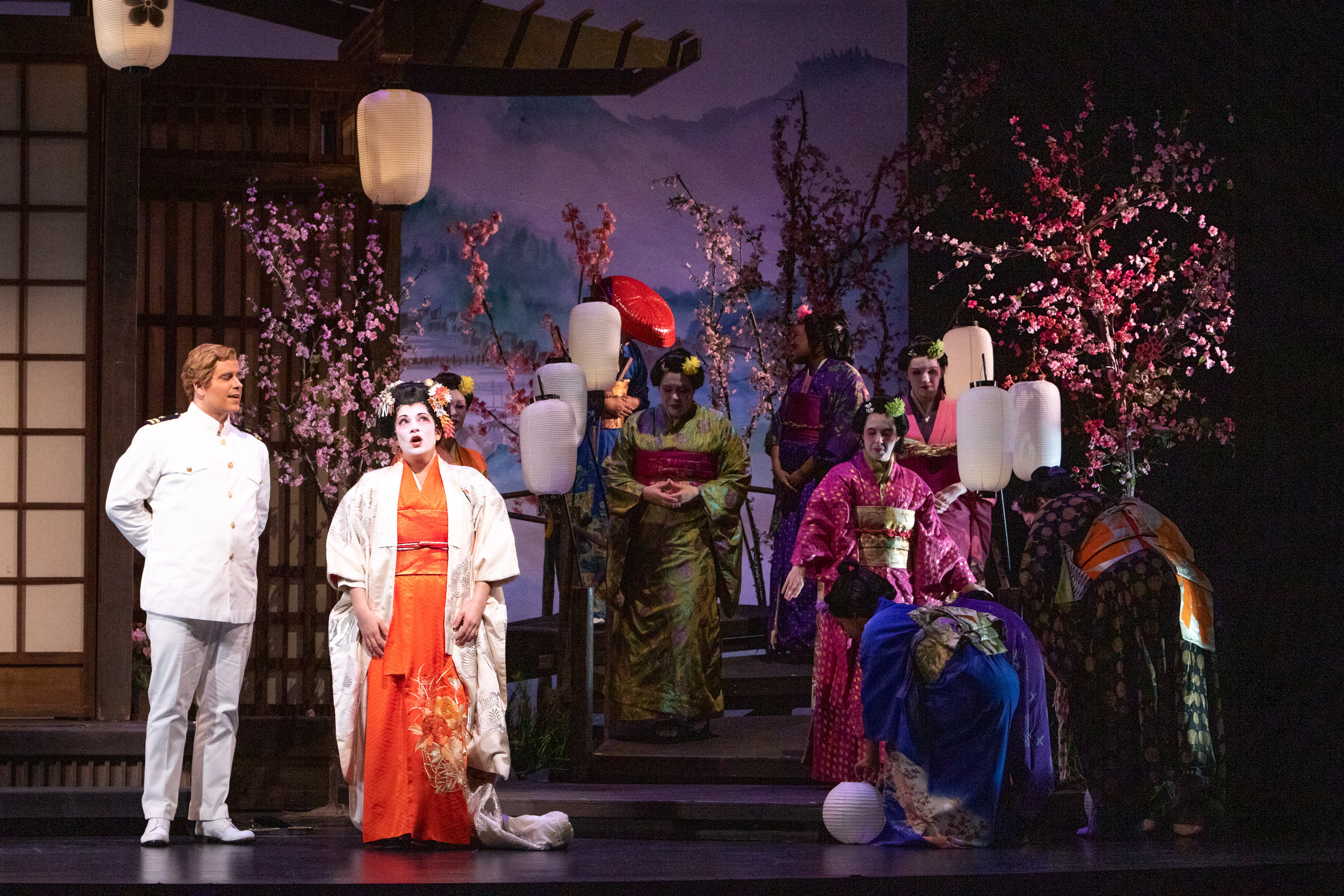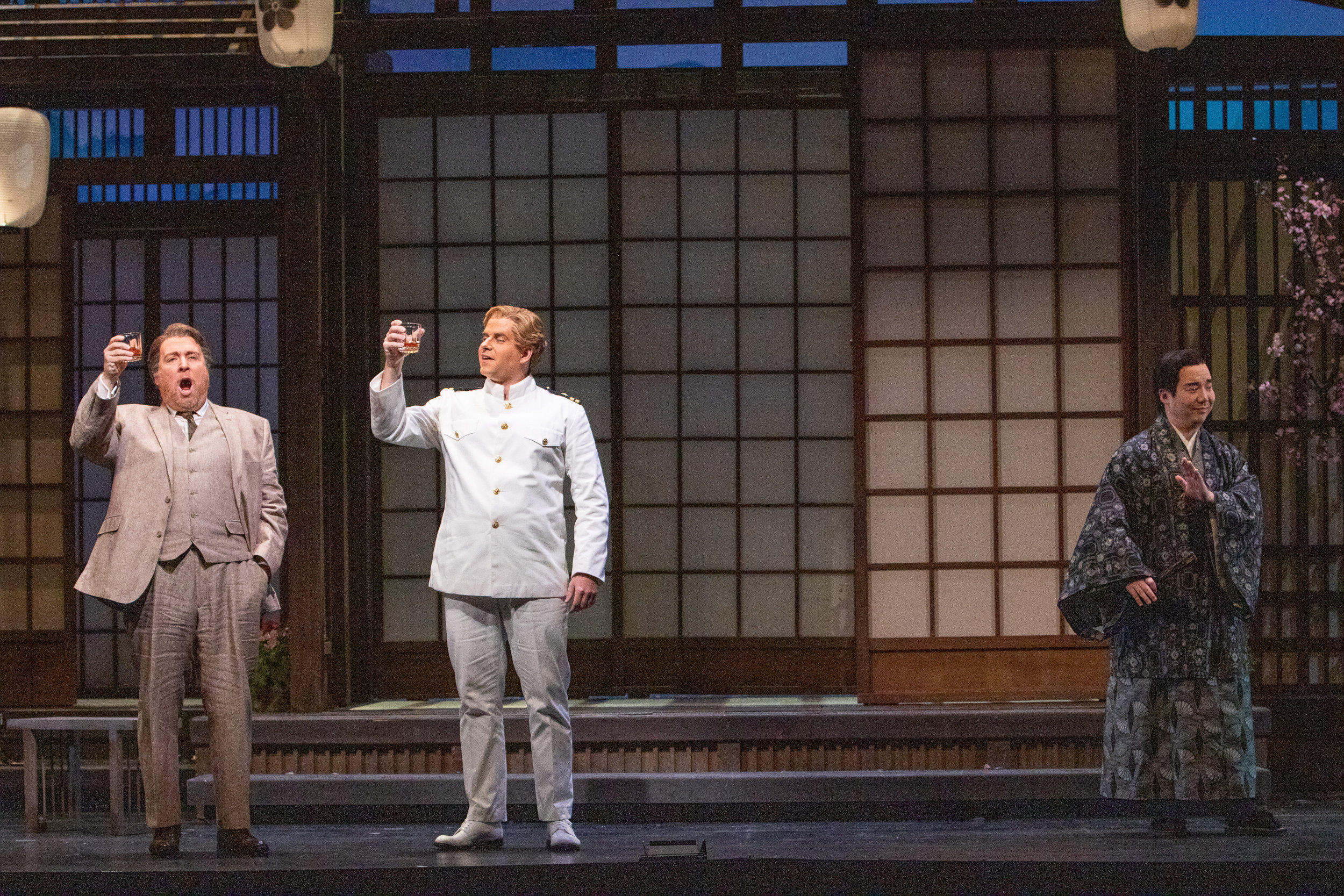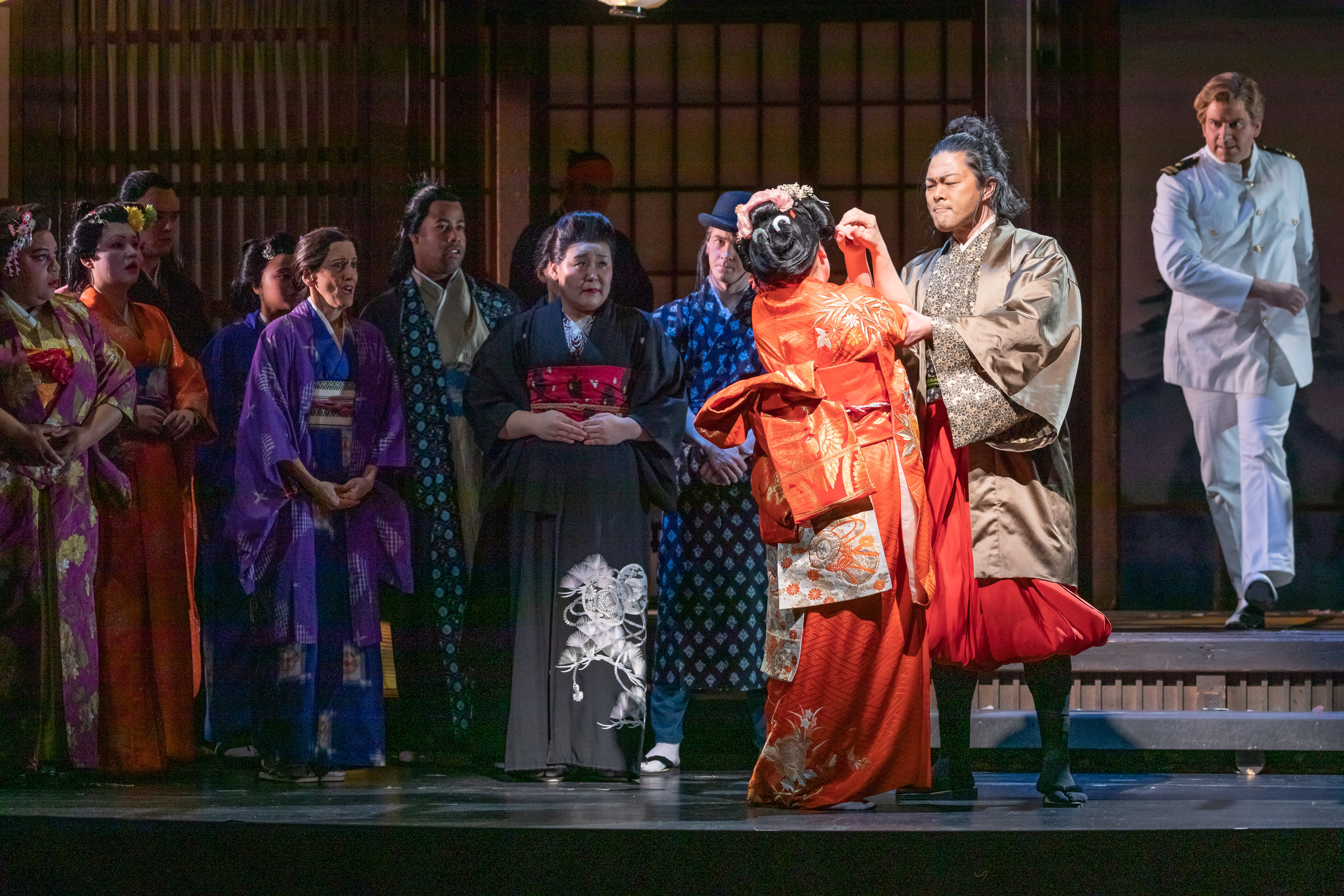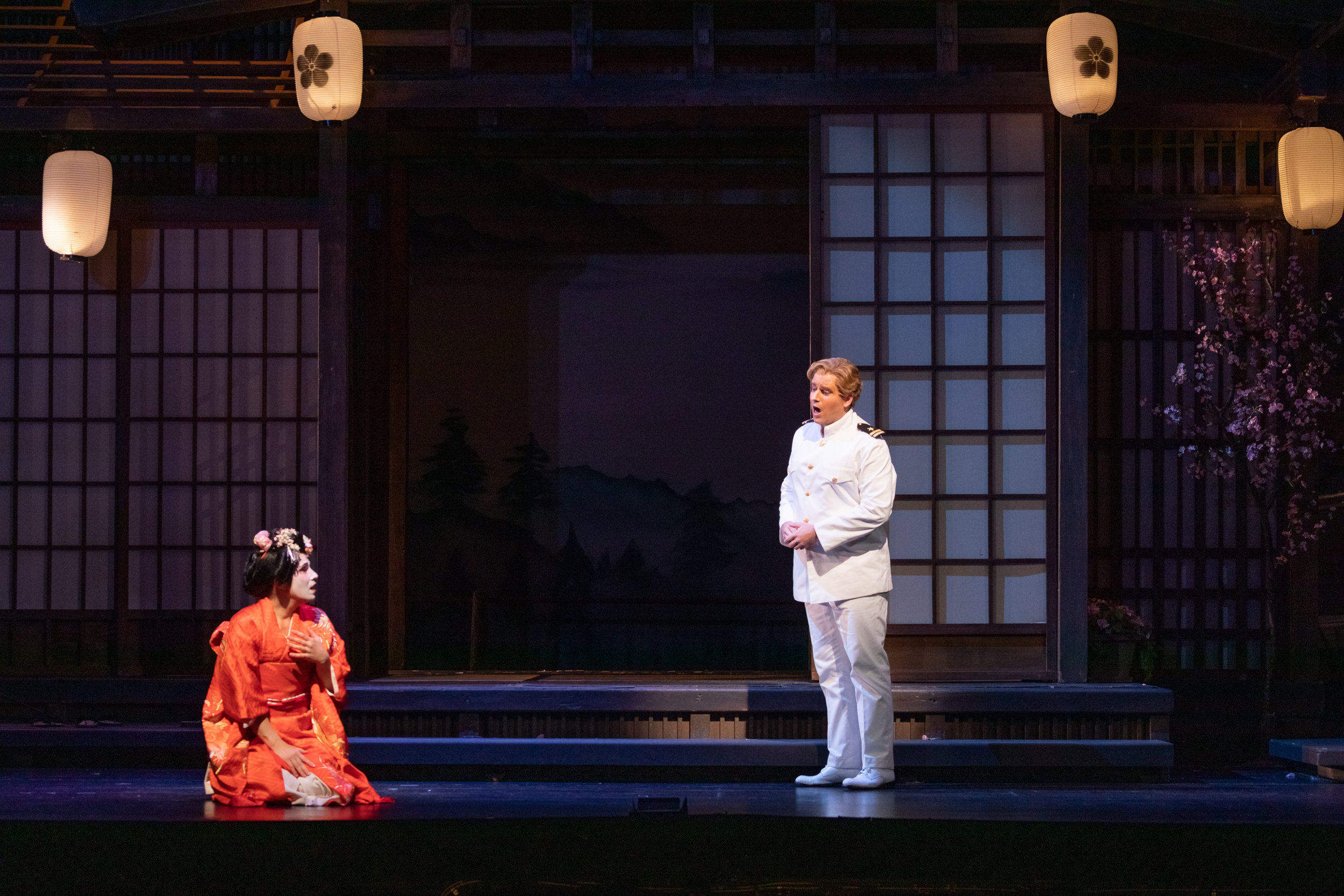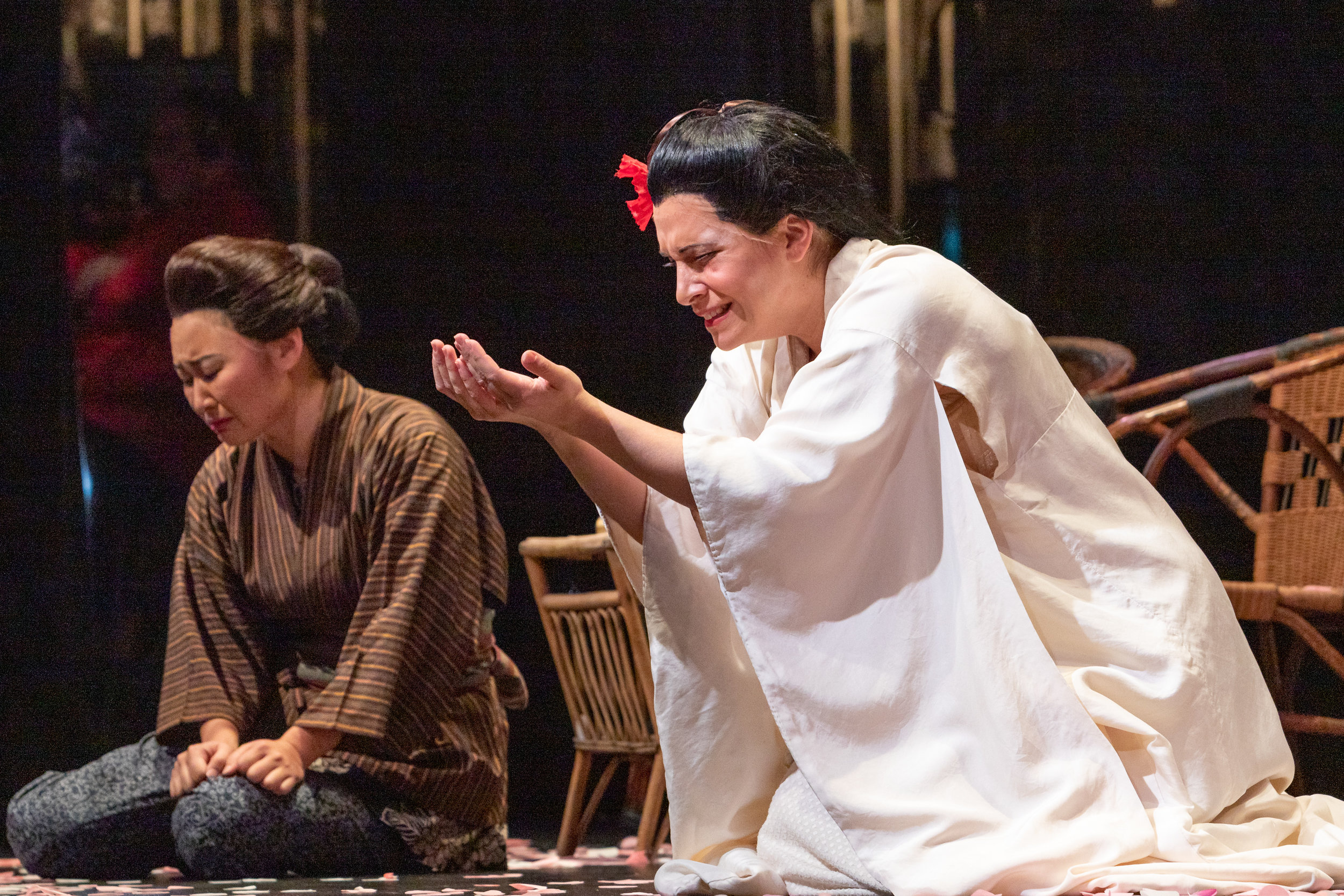What happens when a long line of talented, creative, and dedicated people put their heads and hearts and talents together to help us understand why we humans act the way we do? Today’s answer is Virginia Opera’s Madama Butterfly. You want a love story? It’s got a love story. You want a bad guy? It’s got a bad guy. You want a great set and staging? It’s got that. You want music of transcendent beauty? It’s got Puccini. You want to be touched at your very core? Virginia Opera’s production of this opera will do that. There is a reason why Madama Butterfly is still one of the most popular operas in the world after over a hundred years, more popular than the play it is based on and the short story that gave rise to the play. That profound reason is the incorporation of incredibly beautiful music and human voices that bypass your defenses and speak directly to your heart, making a connection that the author’s and the playwright’s words cannot achieve alone. That is opera’s power, and this is the opera production that I recommend to you if you want to understand why so many of us love opera.
left: Matthew Vickers as Pinkerton and Danielle Pastin as Cio-Cio-San. right: Levi Hernandez as Sharpless, Matthew Vickers as Pinkerton, and Julius Ahn as Goro. Photos by Ben Schill Photography; courtesy of Virginia Opera.
First in the line of creative people responsible for this production of Madama Butterfly (1904) is the incredibly talented composer Giacomo Puccini and librettists Luigi Illica and Giuseppe Giacosa. Just a word about teamwork – Illica and Giacosa were also the librettists for Puccini’s La Boheme and Tosca. Illica layed out the plots and Giacosa largely wrote and refined the lyrics; then the three men argued until it was just right with the composer having the final say. The story and words are also important. Next in line of key creative people is the artistic director of the opera company who must, working with other members of the company, select among all the operatic works which to bring to his audience, then pick a director and recruit singers for each production. The directors select the format for the production and work not only with the conductor, the singers, but lighting and sound staff, the costume designer, and many, many people whose names don’t appear in the program but whose contributions are essential. We may choose to focus credit on the composer, the conductor, or the singers who give special performances, but most of this work is highly interactive and collaborative and, in the end, it is a team effort in the truest sense, with everyone doing their best to get it right. The entertainment and arts experience you have and take away with you is the result of a team of fellow humans reaching out to you.
Matthew Vickers as Pinkerton, Joseph Hubbard as the Imperial Commissioner performing the ceremony, Danielle Pastin as Cio-Cio-San, and Julius Ahn as Goro, the marraige broker. Photo by Ben Schill Photography; courtesy of Virginia Opera.
In Madama Butterfly, Cio-Cio-San is a fifteen year-old Geisha from a dishonored family in Nagasaki in the early 1900s. Through a marriage broker, Goro, she enters into a marriage with B. F. Pinkerton, an American Navy lieutenant stationed in Japan; by Japanese law this contract is for 999 years but can be cancelled with a month’s notice. Cio-Cio-San, also known as Butterfly, places all her hopes in this marriage, even changing to her husband’s religion, but for Pinkerton, despite being warned by his friend, U.S. Consul Sharpless, it is a month to month dalliance before going home. – spoiler alert – Pinkerton is recalled to the U.S. but tells Butterfly he will return but without any conviction to return to her; he leaves unaware she is carrying his child. Now an outcast in her society, she waits for him against the advice of Goro, Sharpless, and Suzuki, her maid, who doubt his return and urge her to engage in another marraige. After three years, Pinkerton returns with his new American wife and learning of the child, plan to take custody of the boy. Butterfly only learns of the wife and their plans on Pinkerton’s arrival. She is devastated but agrees to give up the boy if Pinkerton will come himself to claim him. As he arrives, Butterfly commits suicide.
left: Cio-Cio-San (Danielle Pastin) is denounced by the Bonze (Hidenori Inoue) for changing her religion, as Pinkerton (Matthew Vickers) rushes to her aid. right: Cio-Cio-San is consoled by Pinkerton (Matthew Vickers). Photos by Ben Schill Photography; courtesy of Virginia Opera.
Act I of Virginia Opera’s production is simply stunning, beginning with the set, the costumes, and the lighting. A Japanese house set on a hill with a path leading up to it in the back and a view of the distant countryside as background provides an ambiance of beauty in balance. The house serves as the set for both Acts of Butterfly, Act I outside the house and Act II inside. The scene fills out with arrival of the major characters and then the townspeople in colorful costumes, accompanied by Puccini’s gorgeous music that utilizes Japanese folk melodies for this opera and a few bars of the “Star-Spangled Banner”; I was overwhelmed with sensations, as though it was the first time I had seen this opera. Kudo’s to all involved, especially Director Richard Gammon, Lighting Designer Kaitlyn Breen, Scenic Designer Wally Coberg, Wig and Make-up Designer James P. McGough, and Costume Designer Candice Donnelly.
Cio-Cio-San (Danielle Pastin) and her maid Suzuki (Kristen Choi) listen as Consul Sharpless (Levi Hernandez) tries to warn Cio-Cio-San while Goro (Julius Ahn) listens in the background. Photo by Ben Schill Photography; courtesy of Virginia Opera.
The story telling is traditional and straightforward, no shifts in era or abstractions to muse over. The focus is maintained on the conflicts generating the tensions and the emotions, both expressed and remaining hidden, resulting from both personal struggles and the clash of cultures - Butterfly’s tenderness, vulnerability, and desperation, her family’s and society’s disapproval, Pinkerton’s fun-loving, but callous attitude followed by the pain of his actions, Sharpless’s and Suzuki’s stuggle to manage being both protective and honest with Butterfly.
The singers, beginning with soprano Danielle Pastin who played Cio-Cio-San are excellent at conveying the story. I heard Ms. Pastin a couple of years ago when she played Liu in VA Opera’s Turandot and remarked that she was a singer to watch. Her voice is lovely and she sings Butterfly wonderfully. The pace of the opera was slow, to allow the audience to fully experience the emotions being transmitted. Ms. Pastin showed remarkable poise and control sitting motionless through long musical interludes. Tenor Matthew Vickers makes a fitting Pinkerton who drew boos as well as applause in his bows at the end, the boos of course directed at the character he played, the applause at him. I thought at the end he was more convincing at accepting responsibility for his actions and being remorseful than many of the Pinkertons I have witnessed. Several of the supporting cast had moments in the performance that made me take notice. Baritone Levi Hernandez as Sharpless sang beautifully in an eye-opening performance; Julius Ahn as Goro showed a strong, clear baritone voice that made Goro a stronger participant in this production than I have seen in others, and Kristen Choi as Suzuki had standout arias filled with both power and emotion. I expected this of Ms. Choi, but Mr. Hernandez and Mr. Ahn caught me by surprise; kudos to all three. The other supporting players and chorus added immensely to the drama. The Virginia Opera Orchestra, under Conductor Adam Turner’s sure hand played Puccini’s music in a manner that fully conveyed its beauty and magnificence, sometimes in breath taking fashion.
Suzuki (Kristen Choi) and Cio-Cio-San (Danielle Pastin) confronting the truth. Photo by Ben Schill Photography; courtesy of Virginia Opera.
I cannot report that this was a perfect production. Ms. Pastin’s mature demeanor did not convey a fifteen year-old’s vulnerability, but she did convey the subservience, desperation, and pain of her position. Her vocals might have been a bit soft in a couple of spots. Mr. Vickers competed with the orchestra to be heard on occassion, especially early on. Maybe more of a fault of the opera itself, the long wait for Pinkerton to arrive began to seem like it really might last all night. And to be really picky, I thought, whereas Butterfly and Suzuki shaking plants to get falling flower petals was a neat effect, then having the flower petals flow from ceiling was an unnecessary concession to theatrics, a singular lapse for this production. These are all minor concerns that can be overlooked for such an overall excellent performance.
For a soapbox minute - I loved this approach to storytelling with its emphasis on the story and not how to add effects. I have seen other productions of Madama Butterfly that used different approaches intended to enhance the drama, with lighting or artistic coloration…in one case using a puppet as Butterfly’s son. (I forgot to give kudos to Brayden Livengood for a fine performance as the child in VA Opera’s production). Audiences sometimes like and sometimes not these other approaches to story telling; same for me. They can help enliven interest for an opera that folks have seen many times over like Madama Butterfly. However, when the story is told successfully in a straightforward, classical way, without new theatrical trappings as enhancements, it can have powerful impact and be as gripping as the first time you saw it. VA Opera made that happen Saturday night.
This opera gives us a valuable perspective on love, honor, respecting others, and sacrifice to think about. Madama Butterfly does lack one thing. It lacks a hero and thereby, it lacks a happy ending. Or does it? You came to hear this story and you cared. Maybe you are the hero and the happy ending.
The Fan Experience: The final two performances of Madama Butterfly are coming up in Richmond on Friday evening, March 29, and Sunday afternoon, March 31.
As always, I recommend the pre-opera talk 45 minutes before the opera by Dr. Glenn Winters, VA Opera’s Community Outreach and Musical Director, and note that it can be standing room only; so get there early. I also recommend his blog reports on VA Opera’s next production typically issued just prior to the beginning of performances This time, I will also add that the blog reports on Madama Butterfly are among the best that I have read of his, and I urge you to read for them for their insights into Japanese culture of the period, enhanced by his interactions with his sister who lived virtually all her life in Japan and his visits to her there.

